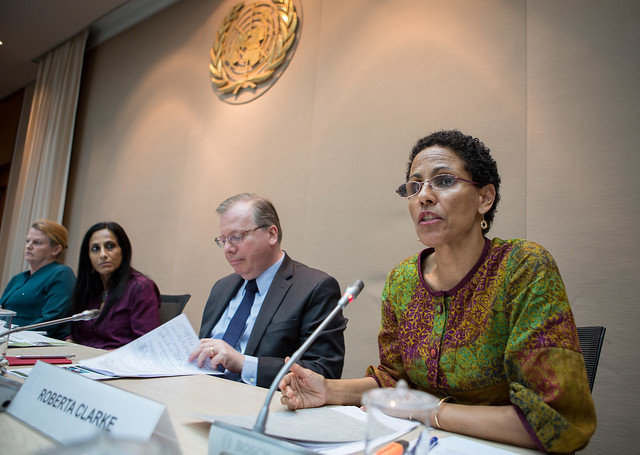Gender Equality is an Enabler to the Achievement of UN Development Goals: a UN Panel
Date:
Authors: Ornwipa Rugkhla and Niels den Hollander
Bangkok, Thailand – To implement this potentially game-changing agenda of gender equality for women and girls we also need to know what it will cost, we need to make informed choices, and we need to recognize that there are challenges and obstacles, agreed a UN panel discussion comprised of regional heads of agencies and Civil Society Organizations, reflecting the Planet 50-50 vision of gender parity.
Discussing possibilities and partnership to meet the UN Sustainable Development Goal (SDG) 5 target, UN Women and ESCAP co-organized the panel of the regional directors of UN Women UNFPA and UNDP and Women Organizing for Change in Agriculture & Natural Resource Management and Srinakharinwirot University of Thailand under the theme: “Achieving gender equality and women’s empowerment: transforming economies, realizing Agenda 2030”, at the Asia-Pacific Forum on Sustainable Development.
The panel discussion is a collaborative effort to take forward the 17 SDGs by 2030. UN Women Regional Director Robert Clarke highlighted that the issue of gender inequality and empowerment affected many targets across the SDGs, for example, the majority of farmers are women, and thus play a vital role in reaching targets such as Goal 2 to end hunger and ensure food security. However, despite being the backbone of global food production Ms. Clarke pointed out that, “Majority of women agriculturists are unpaid family workers, who are out of social security systems and landless, one of the contributing factors for the feminization of poverty.”
The panel highlighted that violence against women and girls, harmful practices, and women’s disproportional burden of unpaid work are all stemmed from unequal power relations between men and women. These outcomes may not only have negative effects on women and girls’ but also carry enormous social and economic costs to the societies and nations as a whole.
The panel then explored practical ways forwards in which they recognized that the SDGs represent a great opportunity to address the issues surrounding gender inequality and women empowerment but highlighted that it is just a beginning.
The panel pointed out that there is a need for accurate data gathering to urge policy makers and those in power to invest in the necessary public resources to tackle issues that SDG 5 attempts to address. They recommended a focus on prevention as the cost is much less than response as well as the need to strengthen the voices from grassroots and promote women’s rights organization to national and global levels.
The panel further emphasized the need to implement SDG 5 across a wide range of policies, including gender responsive education system, funded health care, child care, programmes on sexual and reproductive health, and labour law. Ms. Clarke specifically highlighted the need for institutionalizing gender-responsive budgeting and stated that this has to include “transformative financing, taxation and expenditure. If part of disproportionate allocation of budget to military were given to health and education sectors and measures to reduce unpaid care work, we would have a more equitable society”.
She further stressed the importance to promote more women to take up decision making roles and stated that “setting temporary special measures such as quotas is not only about the promotion of women’s political participation, it is about equal participation between women and men. Despite our work on political participation, the numbers have hardly shifted. To achieve gender equality, somebody has to give up power. And we must fight for that to happen. We must all be fully engaged in the cause.”
Photo Gallery
For more information:
Please contact:
Montira Narkvichien
Regional Communications Specialist, UN Women Asia and the Pacific.
Email: [ Click to reveal ]
UN Women | asiapacific.unwomen.org | @unwomenasia | #Planet5050 #IWD201


